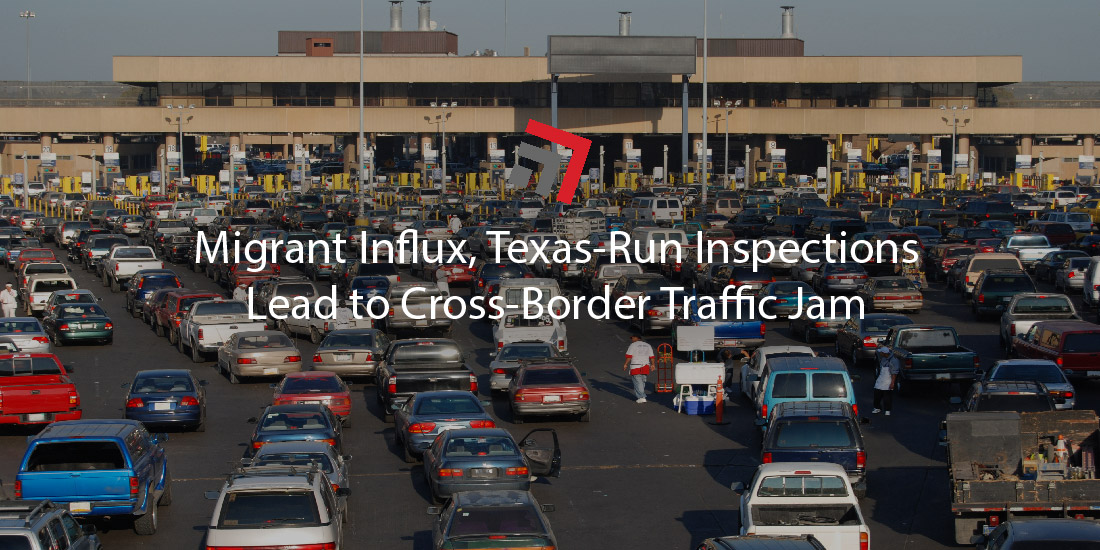Cross-border trade between the U.S. and Mexico has been hit with delays in recent weeks amid a series of migrant crossings and additional commercial truck inspections by the state of Texas. These factors have led to congestion at various port-of-entries along the Southern border.
The current kerfuffle finds U.S.-bound cargo trucks backed up for hours on end. Wait times of 16 hours to cross the border into Texas have even been reported.
Stakeholders assert this issue is hurting businesses in the U.S. As trucks stand idle in Mexico, awaiting entry, distribution centers and factories are awaiting their finished goods, components, or products to arrive. Most of these facilities operate in Texas—a point that stakeholders contest will crush the state’s economy.
Migrant influx prompts bridge closure at El Paso
An influx of migrants in the El Paso, Texas area prompted U.S. Customs and Broder Protection to halt cargo operations at El Paso’s Bridge of Americas on September 18. In return, the federal agency moved cross-border truck inspections to the nearby Ysleta-Zaragoza International Bridge.
By closing northbound traffic on the El Paso bridge, an estimated 600 trucks a day, otherwise handled by this entry, were spread to other nearby ports.
The agency was aware of the potential supply chain kinks from this decision, so in return, CBP extended hours of operation at these other ports of entry to accommodate a deluge of diverted traffic.
While the migrant influx has had an impact on operations, CBP says the trade community and itself have been more than capable of working through this interruption and handling increased activity at these alternative crossings.
In other words, CBP accuses someone else for pouring gasoline onto this fire—the state of Texas.
Texas-run inspections blamed for border congestion
In a case of poor timing, considering CBP’s ongoing handling of a migrant situation, the state of Texas also got involved at the border, much to the chagrin of stakeholders.
The state’s Department of Public Safety (DPS) enforced state-run safety inspections on trucks crossing the Ysleta bridge, as well as the Camino Real Bridge in South Texas. Texas DPS soon implemented similar inspections at the Marcelino Serna port of entry, about 30 miles south of El Paso.
The department has stated these are aimed to prevent cartels from smuggling drugs across the border. It reasons a frequent regiment of enhanced safety inspections will act as a deterrent towards this criminal activity.
The presence of enhanced inspections has been the accused catalyst of the traffic congestion and stifling wait times. In response, trade officials on both sides of the U.S.-Mexico border have urged Texas Governor Greg Abbott to end these state-run inspections.
“It’s all show because [Texas DPS] cannot open the trucks,” U.S. Representative Henry Cuellar (D-Texas) told Border Report. “They can only check for brakes, they can only check for windshield wipers…they cannot open the cargo trailers.”
Stakeholders also warn that if the inspections continue for an extended period, the impacts on cross-border trade would be devastating to recover from.
And, aside from the feared economic earthquake a lingering disruption of this nature could bring, the working conditions are clearly not sustainable for professional truck drivers.
Local trucking associations have had to provide portable bathrooms and food to drivers who are stuck in Mexico waiting to the cross the border.
Trucking companies have also compensated drivers for staying with their truck and load. If a driver were to instead head back to their facility, they’d have to get in line again the next day, losing whatever previous position they had in it.
While these drivers are getting paid to stay in line, it’s certainly not ideal to be sleeping and living in a truck for such an extended period of time.
Final Thoughts
Transportation companies have stated they usually can make two cross-border trips a day. Under these current circumstances, they say they are only able to get one trip in—if they’re lucky.
As the old logistics proverb states—time is money. More time spent waiting means less bang for the buck. Operating costs for driver pay, truck usage, and fuel will still have to be covered. In many cases, these will be passed on to shipper-customers.
Please contact us if you have any questions regarding this topic or any others in domestic logistics. In addition, stay up to date with weekly headlines from both trucking and rail via our Road Map newsletter.
More blogs similar to this:



Recent Comments